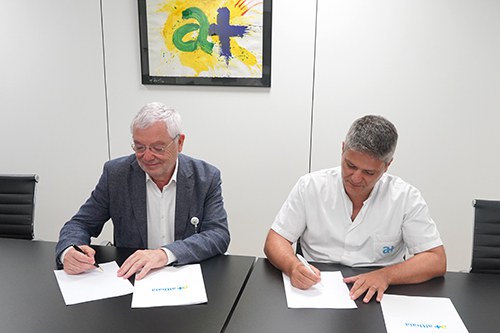The GOES research group is launching a new training tool for gastroenterologists and colonoscopy-trained surgeons worldwide. This is the Training in Optical Diagnosis of early CRC (TOD early CRC) platform, an online tool that should help specialists to improve their skills in the optical diagnosis of early colorectal cancer and its treatment.
The platform is already available in Spain and Latin America and is expected to be offered progressively to Europe and, subsequently, to the rest of the world from September onwards. Until now, only gastroenterologists who have participated in a clinical trial to validate the training tool scientifically have been able to test it.
The project is led by Ignasi Puig, a doctor from Althaia’s Gastroenterology Department and coordinator of the GOES research group. Recently, a governance agreement was signed to carry out the international commercialisation of the tool. Ignasi Puig and Althaia’s CEO, Manel Jovells, signed this collaboration agreement. The profits from the project will be used to finance research, innovation, and teaching projects of the Fundació Althaia in this field.

Thanks to this unique training, the endoscopist can acquire the optimal knowledge to decide, using colonoscopy, which is the best way to remove colorectal polyps, whether benign or malignant. Thus, unnecessary tests and surgeries can be avoided, leading to a less invasive approach for patients.
The platform results from three years of hard work, which involved the collaboration of Althaia’s Research and Innovation, Pathology, Digital Transformation, Communication, Legal Advice, and Financial Management departments. Anna Cano, the Technical Project Manager of the GOES research group, coordinated the team.
Internationally renowned coordinators and tutors
Behind the platform, there is a large team of internationally recognised experts. Maria Pellisé, Head of the Digestive Endoscopy Section of the Hospital Clínic de Barcelona and President of the Spanish Association of Gastroenterology, is the Deputy Director. In addition, the project has five international coordinators: for the UK, Adolfo Parra (Nottingham University Hospitals NHS Trust), Amyn Hajji (King’s College Hospital NHS Foundation Trust) and Bu Hayee (King’s College Hospital NHS Foundation Trust); for the USA, Sarah McGill (The University of North Carolina at Chapel Hill); and for Japan, Taku Sakamoto (University of Tsukuba Hospital).
A panel of tutors completes the team made up of Akiko Ono (Hospital Clínico Universitario Virgen de la Arrixaca), José Carlos Marín (Hospital Universitario 12 de Octubre), Alberto Herreros de Tejada (Hospital Universitario Puerta de Hierro), Marco Bustamante (Hospital Universitari i Politècnic La Fe), Marco Bustamante (Hospital Universitari i Politècnic La Fe), Hugo Uchima (Hospital Germans Trias i Pujol), Marina Solano (Hospital Comarcal de Alcañiz), Enrique Rodríguez (Hospital Universitario Ramón y Cajal) and João da Costa (Consorci Sanitari de Terrassa).
A clinical trial to scientifically validate the project
More than 100 gastroenterologists from 60 hospitals around Spain are participating in the LODIP study clinical trial, which aims to validate the usefulness of the TOD early CRC as a training tool. This study and the platform’s development have been made possible thanks to the funding from the Fundació La Marató de TV3 in the 2018 edition, which had cancer as its central theme.
The clinical trial measures, for one year, the sensitivity of optical diagnosis to predict deep invasion in colorectal polyps in routine clinical practice and evaluates the training results. The project participants must enter information on different lesions and the treatment results into a database.
Two groups have been established to compare the effectiveness of the training. All participants recorded the characteristics of lesions and the relevant clinical results in patients over twelve months. Half of them complete the course after six months, and the other half complete it once the data recording has been completed. Thus, the aim is to compare whether completing the training improves the professional’s skills and, consequently, the patients’ clinical results. As of today, nearly 2,500 cases have already been collected.
